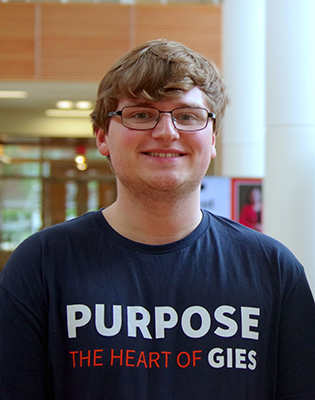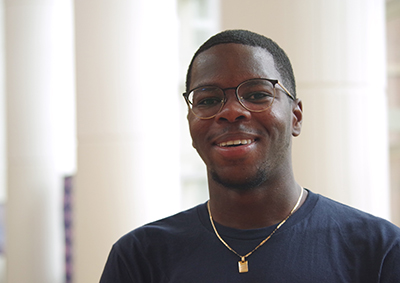Jul 29, 2024
Purpose meets action in revamped cohort course

The curriculum for BUS 401: Crafting Your Purpose in Business – the last course in the cohort sequence required for all Gies Business students – was recently revised to give undergraduate students a chance to apply business skills toward their purpose.
Recent graduate John Massman (ACCY ’24) devoted the final semester of his senior year to optimizing trash pickup services on the University of Illinois campus. The idea struck him while out on the quad. Massman (right) noticed that some trash bins were overflowing while others were low.
He realized that if he thought of each garbage can as individual businesses in a franchise, he could use inventory management tools to develop a more efficient trash pickup schedule. The design and implementation plan became his semester-long “purpose project” in the course.
“I really like serving the community,” Massman said. “Accountants regularly serve the community through tax services, audit, consulting for small businesses, and more. This project showed me how I can further expand upon these business skills to serve the community and planet in many more ways in my career path.”
Reimagining BUS 401
First-year students learn about ethics in BUS 101; sophomores take BUS 201 and learn about the dynamics of business. BUS 301 gives learners a deep dive into problem-solving as a team.
In its former iteration, BUS 401 was called “Global Business Perspectives” and gave students a broad introduction of how global institutions conduct business. Last summer, instructors Sandra Corredor and Heather Swenddal revised the curriculum to focus more on students’ readiness for life post-graduation.
“Business 401 is our students’ culminating cohort experience,” Swenddal said. “We wanted to use this opportunity to help them get really intentional about their values and build reflective habits that serve them throughout their careers.”
This change in curriculum came about as a result of a growing desire among College leadership to infuse “purpose” into instruction. When the charge to reimagine BUS 401 came from leadership, Corredor and Swenddal were placed at the helm. They started by poring over surveys of students at Gies Business and other business schools, gaining insights about students’ needs and wants as they approached graduation, and they derived learning objectives and course topics from the data.
“Oftentimes you have an idea of the topics that you want to teach, and then you go back to learning objectives,” Corredor said. “I think that, here, pedagogically, we built the course from the ground-up: learning objectives, students' interests, and stakeholder engagement came first.”
After a lot of brainstorming, they brought their pitch to College leadership.
“They were really enthusiastic and supportive of what we came up with,” Swenddal said.
Throughout the rest of the summer, Corredor and Swenddal worked to make their vision a reality. They read books, enrolled in online courses, and collaborated with stakeholders across Gies Business. Nearly every corner of College operations – from experiential learning to alumni engagement – had a hand in ushering the new course to fruition.
Facilitating personal development
The new course content was structured around three main learning objectives: for students to know their purpose, develop their skills, and engage with their communities.
In the early weeks of the course, students self-examined their skill sets. Later students used those results to pursue a self-development project to bolster skills they wanted to grow, as well as a purpose project that leveraged their strengths.
Another major change to the course format was the introduction of “growth groups” – small gatherings where students reflected on their experiences throughout the semester. The growth groups proved vital to the structure of the course. Instructors noticed that as the semester progressed, social accountability in the growth groups seemed to motivate the students much more than a final grade.
“We want them to be sitting in growth groups and in our full class, looking around and thinking, ‘these are my future contacts on LinkedIn. This is my alumni community. Some of these people might give me a job someday. I might be hiring some of them someday,’” Swenddal said.
Making an impact

In spring 2024, BUS 401 students collectively invested more than 4,500 hours into projects that served community businesses, nonprofit organizations, public institutions, and individuals in at least 75 different communities.
For his purpose project, Brian Kamson (FIN ’24) helped develop and deploy a financial literacy program for middle schoolers in his hometown. According to Kamson (right), the path to stakeholder buy-in for his program required a lot of diplomacy, and he had to rely on his relationship-building and teamwork skills to overcome some unique challenges. Thanks to his patience and persistence – and reliance on facts and data – he was ultimately successful in implementing the program.
Kamson and Massman, who developed the trash pickup schedule, both earned leadership awards for their projects after being nominated by peers in their respective course sections. Kamson credits BUS 401 with helping him realize his passion for serving his community.
“I think my time here at Gies has really opened my eyes to different ways I can improve my purpose, to help other people with the knowledge I’ve been given.”


